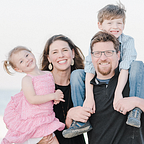Addition by Subtraction
After several weeks of heavy international travel and an intense 2016 H1, I decided to Be Awesome With Myself and not work for a few days.
So, I canceled a trip to FullContact’s Latvian offices and decided to hang out in Boulder for a mini “stay-cation.”
Normally I am out the door leaving Boulder to head to Denver by 6AM and come back around 7 or 8PM. So I don’t get to spend much of my day to day in my own hometown.
However, spending the past few days in Boulder during the summer months reminds me how magical this place is.
I absolutely adore living here.
I have walked around the town a bunch.
I have gone on several hikes.
I have meditated by Boulder Creek.
I have sat in coffee shops and journaled and thought about the future.
I have reconnected with friends I haven’t seen in far too long.
I have also read a bunch.
One of the books I read is Essentialism:The Disciplined Pursuit of Less by Greg McKeown.
This book has been a powerful reminder for me that Less is More.
We can often be overwhelmed with the choices we have to make on a daily basis and say YES to far too many things.
The past year or so in my daily life, I have been intentional about removing many of the non-essential things that occupy my time.
I haven’t missed any of these things. At all. They are non-essential, after all!
On the work front, FullContact has been achieving some incredible milestones as of late and is in the throes of significant scaling.
Scaling a company makes lots of small things into big things and adds inherent complexity to the system. It also creates innumerable projects, initiatives, todos, meetings, follow ups, metrics, and then more meetings.
When this is happening, it is important to step back and ask “What really matters here? What are the most important things to get done?”
At that point and with this mindset, the challenge of scaling becomes about removing things, not adding things.
It’s super easy to generate ideas and easy to try to do more.
But then, invariably, as the saying goes, you end up “making a millimeter of progress in a million directions”
Doing less but better is much harder to accomplish. Saying No to someone’s idea is hard.
Hell, saying No to your own idea is even harder!
At the start of the week I made a list of all the things I want to accomplish at work by the end of the year.
The list initially had 15 things on it. Every morning, I have been whittling it down and rewriting the list and brutally prioritizing.
I have been spending a ton of time thinking about the trade-offs of each choice and asking myself: “What problem do I want to have?”
After a few days of this, I am now down to 5 things.
I hope to get to 1 BIG thing by the end of my stay-cation.
Ironically, by taking time away from the office in solitude and reflection, I feel like I have accomplished more for the company the past few days than I would have otherwise!
It reminds me a bit of a famous story about Steve Jobs at a leadership offsite during his second CEO stint at Apple.
For a few days, he and the the “inner circle” of a 100 or so people got all the big company initiatives and ideas for the next two years on the table.
They argued.
They debated.
They prioritized.
Finally, at the end of the two day period they got the list of hundreds of possibilities down to a list of 10 BIG things.
Steve Jobs took the list of 10 BIG things and wrote them on the whiteboard.
He said “Great. I am glad we are down to these 10 things. But we can only do 3 of these things really well. Now let’s eliminate 7 of them!”
It took another two days, and there were some really hard decisions, but eventually they got to 3 really important things.
And, of course, over the ensuing years, they went super deep and executed those 3 things really, really well — as only Apple does.
I don’t need to tell you about Apple’s success — you know that — but there’s obviously a lesson there.
So, next time you are faced with hard choices, be unafraid to say NO.
Step back, and think about what really matters and what doesn’t.
Then go do what matters. Do it deeply, obsessively and iteratively, and do it unbelievably well.
